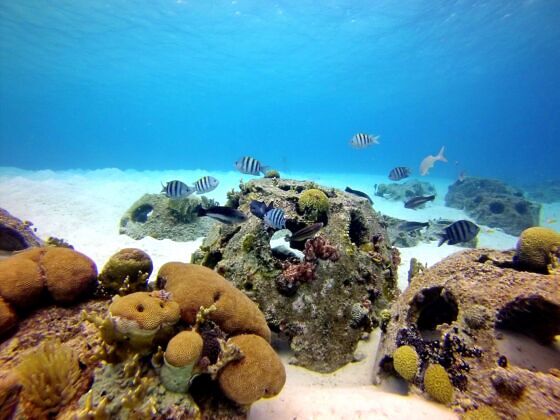People are looking for meaningful, alternative, and more environmentally friendly ways to be buried. That’s led to the rise in people choosing to compost their remains, be buried with a tree, or to even be buried in a quickly decomposing fungi coffin. It’s not just land-bound options: The latest trend returns your body to the ocean and uses human remains to help new reefs grow.


Ocean Lovers Can Now Have Their Cremated Remains Turn Into a Coral Reef
The service is offered by Eternal Reefs, a charity based in Florida. It works by using artificial reef balls made of pH-neutral concrete that human ashes are put inside. Then those reef balls are seeded in seabeds around the US to promote new reef growth. To be close to their loved ones, family and friends will know and can travel to the GPS coordinates where their loved one is located. The charity believes the service is popular with people who love the sea with a desire to help re-populate marine life. As we see the decimation of reefs worldwide, it’s crucial to preserve reefs as they assist with protecting shorelines and marine ecosystems.
It’s important to note that becoming a part of an artificial reef still requires cremation, which, on average, releases 882 pounds of carbon dioxide into the atmosphere for each cremation, according to The Guardian. And the artificial reefs also use concrete, which is a material with a high carbon footprint.
However, these reef balls really do help populate oceans with plants and other marine life. As seen with other artificial reefs around the world, structures can provide food and shelter for a diverse array of marine life.
Each 550 to 4,000 pound ball has space for marine plants and animals such as corals and algae to grow on them in just a few weeks. The organization currently has 3,000 memorial reefs across about 25 sites. A reef ball will cost you between $3,000 and $7,500. A similar company, Neptune Memorial Reef, which is also based in Florida, also provides memorials for $1,295. The latter company’s artificial reef is home to 56 species of fish, along with crabs, sea urchins, sponges, and coral. When complete, the Neptune Memorial Reef will have 250,000 memorials covering 16 acres, making it one of the world’s largest human-made reefs.
So if you love the sea, this is one way to be sowed into it.